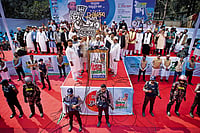It was an “operation done with surgical precision” designed to have “the maximum impact, with the minimum noise,” a Trinamool Congress (TMC) veteran told this writer on Saturday evening after the West Bengal chief minister and TMC supremo Mamata Banerjee announced a new, 20-member national executive committee of her party, which by default dissolved all existing posts.
The move to reconstitute the party’s leadership structure is widely being seen as one attempt to stave off a possible rebellion by her nephew and heir apparent, Abhishek Banerjee, the 34-year-old Lok Sabha MP from Diamond Harbour who was appointed as the party’s all-India general secretary in June last year, barely a month after the party’s landslide victory in the assembly elections.
Since forming her party in 1997 after rebelling against the Congress leadership of the day, especially the state unit leadership and the national president Sitaram Kesri, Mamata Banerjee has faced a number of internal rebellions within her party, with trustworthy lieutenants deserting her. She has withstood all such rebellions, no matter how influential the rebel leader/leaders was/were.
But this was closer home. It not only involved her nephew and expected successor but he was also getting support from other members of Banerjee’s family who are of his generation – one of Mamata's nieces, Aditi Gayen and another of her nephew, Akash Banerjee, for example.
In the new 20-member committee, apart from Banerjee, the chairperson, the rest are all equals now. At least, until she names the new office-bearers.
Having brought in political strategist Prashant Kishor to work with the party after the 2019 Lok Sabha election losses, Abhishek was considered one of the architects of the party’s 2021 victory and the party chief had probably thought it was the right time to initiate the succession process.
However, a set of events over the past one month indicated a souring of their relations, culminating in Abhishek’s indications to her close ones that he might step down. “Didi took it as Abhishek’s ploy to blackmail her. She never takes blackmailing lightly. I think she has shown on Saturday who’s the boss,” a TMC Rajya Sabha MP said, requesting anonymity.
However, given her track record of dealing with internal rebellions, it would not be surprising if Abhishek’s name features among the list of office-bearers once more. She tends to forgive rebels once they acknowledge their mistake and accept her superiority.
Here is a look back at how she dealt with rebellions.
Ajit Panja
Panja was perhaps the biggest stalwart of Bengal Congress to leave the party with Mamata Banerjee in 1997 and was one of the pillars of founding the new party. In the 1999 Atal Bihari Vajpayee government, Banerjee was a cabinet minister while Panja was a minister of state. However, he fell out with Mamata Banerjee over his differences with her on quitting the NDA in 2001. Following the Tehelka expose, the party had decided that Banerjee and Panja would resign from the cabinet but the party would continue to support the NDA from outside. But later Mamata decided to snap ties with NDA altogether and join hands with the Congress instead for the 2001 state assembly elections.
Following Panja’s public outburst against Banerjee, including calling her ‘insane’, the TMC stripped him of all posts, including that of the chairperson of the party’s policy-making body, in April 2001, and suspended him later in July. Towards the end of 2001, Panja tried to form his own faction of the TMC and even approached the Election Commission of India to get its recognition but failed in his second mission. In 2003, he tried to float another open platform to gather TMC dissidents but failed again.
By August 2003, after his rebellion ended, Mamata took her back in the party. In 2004, she renominated Panja from his Calcutta northeast Lok Sabha seat, though Panja lost. He died in 2008. Later, Banerjee gave his daughter-in-law Shashi Panja, assembly election ticket in 2011, made her a junior minister in 2016 and a cabinet minister in 2021.
Pankaj Banerjee
Another senior leader of the Congress to leave with Mamata, Pankaj had been made the chairman of the Trinamool platform within the Congress when the new party was yet to be launched. When the party was formally launched, on January 1, 1998, it had MLA Pankaj Banerjee as chairman and Mukul Roy as general secretary. However, Banerjee fell out with her soon after and returned to the Congress in June 1998. But they patched up after a few months, Mamata again made him the chairman of the party’s policy-making body and, after the 2001 assembly election, made him the leader of the opposition in the state assembly. Pankaj again fell out with her in 2006 and retired from politics altogether.
Sudip Bandyopadhyay
One of the four sitting Congress MLAs who joined the TMC at the time of the party’s birth, Sudip Bandyopadhyay was the TMC’S chief whip in Lok Sabha since 1999. In 2003, the party had rejoined the NDA and was slated to get back ministerial portfolios. Trouble broke out in the TMC after Mamata got wind of the BJP’s plan to induct Mamata as a cabinet minister and Sudip as a junior minister.
Sudip apparently had a good rapport with home minister L K Advani, who had arranged for his induction in the cabinet. Mamata was angry that Advani took such a call without consulting her. She thought the BJP was interfering in her party’s internal affairs, refused to accept her own portfolio and expelled Bandyopadhyay from the party. In 2004, ahead of the Lok Sabha election, Bandyopadhyay returned to Congress. His wife, Naina, who was a TMC MLA, followed him. In 2006, Bandyopadhyay won the assembly election on a Congress ticket.
However, in 2008, Mamata took her back into the party, gave him the Lok Sabha election ticket in 2009. Since 2011, he has been serving as the TMC’s leader in the Lok Sabha. In 2014, Mamata also gave an assembly by-poll ticket to Naina Bandyopadhyay. She continues to be a TMC MLA.
Subrata Mukherjee
Once Mamata Banerjee’s mentor during her days in student politics, Subrata Mukherjee joined TMC in 1999. In 2000, after the TMC won the Kolkata Municipal Corporation election, she made Mukherjee Kolkata’s mayor. However, the two fell out towards the end of his tenure over Mukherjee’s plan to introduce water tax to raise the civic body’s income. Mamata strongly objected to the proposal and the two fell out. Mukherjee subsequently contested the election on Nationalist Congress Party’s ticket. The split helped the Left win the KMC in 2005. Mukherjee had publicly launched several personal attacks on Mamata Banerjee.
However, he too made his way back to the TMC in 2010 and in 2011, after coming to power in the state, Mamata Banerjee made him the panchayat and rural development minister, a portfolio he retained till his death in October 2020. Mukherjee was among the only two ministers in Mamata’s 10-year-rule whose principal department did not change.
Dinesh Trivedi
One of the founding members of the TMC, Trivedi became the railway minister in 2011 after Mamata Banerjee quit the Union government to take charge as Bengal chief minister. However, in 2012, as Trivedi announced an increase in passenger fare in his railway budget, Banerjee was irked, opposed the budget and asked Trivedi to roll back the proposed fare hike. Trivedi refused to budge and Mamata forced him to resign.
However, Trivedi later patched up with her and she gave him renomination from Barrackpore Lok Sabha. In 2019, after Trivedi lost from Barrackpore, she even sent him to Rajya Sabha. Nevertheless, Trivedi ditched her for a second time ahead of the 2021 Assembly election, when he resigned from Rajya Sabha and joined the BJP.
Mukul Roy
Another founder-member of her party, Roy was perhaps the closest of her aides since 1997. He was known as the uncrowned ‘number 2’ in the party even before it came to power and all the more so after 2011. However, Roy fell out with Banerjee, apparently over Abhishek’s sudden rise through the party ranks that indicated Mamata was installing him as her successor, in 2014.
He was the party’s all-India general secretary for a long time but towards the end of 2014, as Roy started singing a different cord with regard to the CBI investigation into the Saradha chit fund scam, Mamata first appointed another all-India general secretary, Subrata Bakshi, and later removed Roy from the post. However, they patched up in 2015, with Mamata appointing him as a national vice-president this time. They again fell out in 2017. This time, to show Roy the door, Mamata simply removed the post of national vice-president.
Roy switched over to the BJP, eventually becoming one of the BJP’s leading faces in the state, serving as the chairman of the election management committee for the 2018 panchayat election, 2019 Lok Sabha election and 2021 assembly election. In 2020, the BJP also appointed him as a national vice-president, as it was largely due to Roy that they managed to engineer some defections in the TMC camp ahead of the Lok Sabha elections and several of Roy’s candidates ended up winning on a BJP ticket.
However, despite leading her principal rival’s charge in the state, Banerjee took Roy back into the party soon after the TMC’s landslide victory in the 2021 assembly election. When journalists asked on that day what could TMC expect to gain from bringing him back, Banerjee said, “It will be good for him. He was under mental pressure and disturbed. He will get mental peace. He was one of our own. Good to get him back.”
The latest series
The party faced massive desertion of leaders ahead of the 2021 assembly elections, with a number of MLAs and even MPs switching over to the BJP. Though Mamata Banerjee, Abhishek and other leaders kept telling that those deserting the party at this hour would never find the party’s door open, Banerjee was again at her benevolent best after achieving the spectacular victory. She took several such deserters back, including minister Rajib Banerjee and former MLA and Bidhan Nagar mayor Sabyasachi Dutta. The latter had publicly launched personal attacks on her.
This, however, became one of the bones of contention between Mamata Banerjee and Abhishek, as the latter was strongly against allowing such return.
During an interview with a Bengali TV news channel last week, Abhishek said that as long as he was the general secretary, he would ensure deserters must undergo a period of atonement before being reinstalled in the party. “Take the case of Rajib Banerjee. I have ensured he serves in Tripura for three years,” he said.
However, when asked about the case of Datta, the junior Banerjee said, “There have been a few exceptions because Mamata Banerjee is benevolent. However, I am practical and scientific.”
Now that Abhishek also finds himself being only a part of a 20-member national executive committee – with none of those known to be close to him part of it – TMC old-timers say Abhishek can still bank on Mamata’s benevolence to get his position back.
“She knows how to forgive, though she does not forget,” said one of her close confidantes.


























